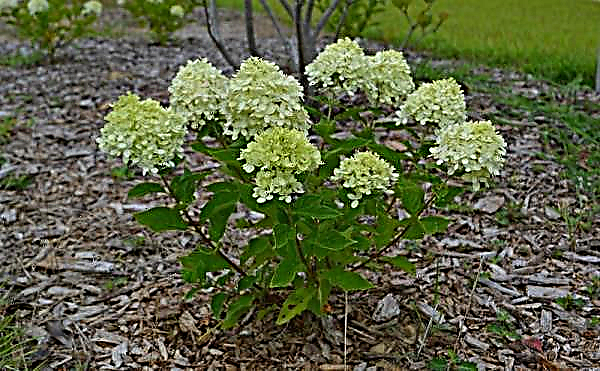Ginger root has long earned the title of natural healer. No spice has such a wide range of uses as ginger. How this spice helps with kidney failure and how it works in the treatment of urinary tract pathology, let's understand.
Is it possible to use ginger root for diseases of the kidneys and urinary tract
Ginger tinctures have a beneficial effect on the body, as this plant contains 3% essential oils, a wide range of vitamins, as well as such components:
- calcium (a useful and completely irreplaceable element);
- fluorine;
- potassium;
- magnesium;
- zinc;
- flavonoids;
- organic acids (carboxylic, sulfonic, etc.);
- tannins.

Infusions, teas and decoctions can be used in the treatment of chronic diseases of the urinary system. In any case, having a particular disease of the genitourinary system or kidneys, treatment should begin after a thorough examination of the patient. If there is only sand in the kidneys, the treatment will be effective. If stones of impressive sizes have formed, then self-medication without consulting a specialist may be unsafe.
Important! With kidney formations, ginger infusions can be taken if the stones do not exceed 1 cm in diameter.
The healing properties of ginger root for the treatment of pyelonephritis
What effect ginger drinks have on the kidneys depends on the characteristics of the body.
- But in any case, the healing composition has such useful properties:
- anti-inflammatory;
- antibacterial, antiviral, antimicrobial;
- stimulating;
- antispasmodic;
- diuretic;
- antioxidant.
A property such as a diuretic gradually cleanses the renal canals of sand. Ginger also stimulates the movement of stones. If the kidney is inflamed, then the plant will relieve the symptoms of inflammation, expand the blood vessels due to the antispasmodic properties and anesthetize.

The folk “doctor” relaxes the smooth muscles of the internal organs (including the kidneys) and helps to cleanse them. It has ginger and another useful quality. Since the cause of the formation of stones is a metabolic disorder, it can positively affect this process: improves digestion, helps cleanse the blood, etc.
Did you know? There is a theory that Ginger was brought to Europe by Marco Polo. Europeans liked the taste so much that they began to use it as a spice, and later as a medicine. For example, this root was considered the main means of preventing plague.
Traditional medicine recipes with ginger for kidney pain
There are many ways to use ginger decoctions to treat kidneys. Most of them really have an amazing effect. Decoctions with the addition of other components are especially effective.
Ginger Tea with Lemon and Honey
This drink will not only relieve pain in the lower abdomen, but also help to remove toxins, improve digestion, activate urine excretion, and also refresh the complexion.

Essential Ingredients:
- grated ginger - 1 tbsp. the spoon;
- water - 200 ml;
- honey and lemon to taste.
The cooking process is simple and consists of the following actions:
- The water is brought to a boil, ginger is added to it.
- Remove the drink from the heat and insist for several minutes.
- Filter, add honey and lemon, take inside.
The drink does not start to act immediately, its constant consumption is required. You can drink 2-3 cups per day. Such a decoction can be taken to prevent diseases of the kidneys and the genitourinary system. In the absence of strict contraindications (disruption of the digestive tract, liver disease), there will be no harm from such a drink.
Ginger tea with green tea
Any disease is best treated by combining traditional and non-traditional methods. The main thing in solving the problem is systematic and regular. There is a simple recipe for an effective remedy - green tea, brewed with several slices of ginger. These products are characterized by an excellent diuretic effect, therefore, they are actively used in the treatment of renal diseases.

Kidney tea is easy to prepare: a teaspoon of tea leaves and ½ teaspoon of grated ginger are put in a cup and pour boiling water. Give tea to infuse 3-4 minutes. They drink in a warm form. The last appointment should take place no later than six in the evening. It is allowed to add lemon and honey to improve the taste.
Did you know? If you chew fresh ginger, you can get rid of the smell of garlic and eliminate harmful bacteria in the oral cavity.
Ginger and turmeric tea for kidney stones
Turmeric is the most recommended spice for cleansing the blood. It enhances the urinary effect of ginger. Any remedy based on this spice has anti-inflammatory and anesthetic qualities, since the active component of curcumin is rich in antioxidants. Due to this property, turmeric is widely used to treat many diseases.

For centuries, turmeric has been used to cleanse the kidneys. This spice calms inflammatory processes (pyelonephritis, etc.) and cleanses organs of toxins. Turmeric also helps break down proteins and salt deposits. Turmeric may also have a protective effect by acting on the urinary tract. First of all, it prevents their blockage, and then creates a protective barrier against viruses and bacteria.
Natural ginger tea with turmeric is an old drink recommended for people with kidney stones or as an adjunct to the treatment of kidney diseases. Turmeric and ginger pacify inflammatory processes, help destroy deposits. It is also worth mentioning that the drink is nutritious and, in addition to helping the kidneys, is useful for blood circulation, blood vessels, joints. It also affects other important organs.
Important! The systematic use of the drink significantly reduces the risk of developing hypertension and has a positive effect on mental abilities. If the liver is sick, drink is not recommended.
If you have been diagnosed with kidney failure or other kidney disease, you need to take the following ingredients:
- ginger root - 2.5 cm;
- turmeric powder - 1 teaspoon;
- water - ½ liter;
- natural honey (optional) - 1 tablespoon.
The cooking process consists of the following steps:
- Pour water into a metal container and bring to a boil. Pour ginger and turmeric with boiling water.
- Leave the tea for 10-15 minutes. The drink should become concentrated.
- Strain the broth, add honey, and treatment can begin.
 Drink tea on an empty stomach every morning.
Drink tea on an empty stomach every morning.
Terms of use
Ginger contains a large number of active elements, so there are some rules when applying it:
- At first, a feeling of heat may occur. This is completely normal - this is how the body reacts to the activation of certain natural processes. To prevent this condition or if the kidneys start to hurt, they drink tea in small portions.
- If tea has an unpleasant aftertaste, then it is poorly filtered. Also, an unpleasant taste happens if the root was stale (with mold, wrinkled).
- If excess excitability is inherent in a person, then it is better to drink the drink less often. But at night, take ginger tea is not worth it.
- If it is noticed that after tea there is a feeling of hunger, then it is advisable to drink it after a meal. Such a technique will not bring harm, but it will prevent overeating.
- Maximum you can drink no more than two liters of drink per day. Doctors do not recommend taking decoctions in large quantities.
The key to successful treatment will be not only the proper use of the drink, but also its competent preparation, as well as the choice of quality ingredients.
Contraindications
Unfortunately, the benefits of ginger root are not available to everyone.
There are some contraindications:
- Weak stomach and intestines. The plant is rich in essential oils and phenols that irritate the mucous membranes. And this leads to exacerbations of gastrointestinal diseases. For stomach ulcers, the use of ginger is a taboo.
- High fever, bleeding, fever. Ginger tea has a warming effect, so it is not recommended also on hot summer days and with burns.
- Diseases of the liver and gallstones. It is not recommended to take ginger infusions and decoctions with such pathologies, since this spice activates the production of bile.

- Ginger may also be the culprit in the appearance of such negative reactions:
- skin rashes, dryness and peeling;
- visual impairment;
- heart rhythm disturbances, insomnia;
- a sharp change in mood;
- allergy.
It is worth noting that such a harmful effect occurs as a result of an overdose. It should also be borne in mind that ginger root may not be compatible with certain medications, so you should consult a doctor before treatment.
Important! The use of ginger is stopped in acute chronic kidney diseases and with cystitis.
As you can see, ginger for the kidneys is very useful. Just do not abuse it, and before use it is necessary to get the advice of a doctor and find out if you have a contraindication to use. And remember: self-medication can be harmful.












